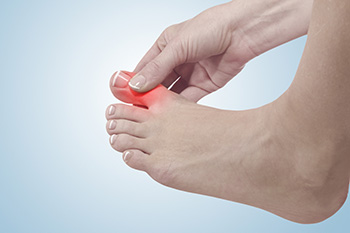
Foot pain is often dismissed as temporary, but lingering discomfort may signal a deeper problem. Soaking your feet and gently massaging sore areas can offer relief, but persistent pain requires more than home remedies. Simple movements like ankle circles and toe stretches can ease stiffness and improve mobility. Wearing different shoes throughout the week helps reduce stress on certain areas of the foot, allowing tissues to recover. Pain may come from overuse, wearing improper footwear, or hidden conditions such as tendon injuries or nerve issues. Left untreated, these problems can grow worse, making walking difficult and limiting daily activity. Paying attention to what your feet are telling you is key to staying mobile and pain-free. If you have consistent foot pain or if symptoms seem to worsen, it is suggested that you see a podiatrist for an accurate diagnosis and appropriate treatment.
Foot Pain
Foot pain can be extremely painful and debilitating. If you have a foot pain, consult with the podiatrists from New England Family Foot Care. Our doctors will assess your condition and provide you with quality foot and ankle treatment.
Causes
Foot pain is a very broad condition that could be caused by one or more ailments. The most common include:
- Bunions
- Hammertoes
- Plantar Fasciitis
- Bone Spurs
- Corns
- Tarsal Tunnel Syndrome
- Ingrown Toenails
- Arthritis (such as Gout, Rheumatoid, and Osteoarthritis)
- Flat Feet
- Injury (from stress fractures, broken toe, foot, ankle, Achilles tendon ruptures, and sprains)
- And more
Diagnosis
To figure out the cause of foot pain, podiatrists utilize several different methods. This can range from simple visual inspections and sensation tests to X-rays and MRI scans. Prior medical history, family medical history, and any recent physical traumatic events will all be taken into consideration for a proper diagnosis.
Treatment
Treatment depends upon the cause of the foot pain. Whether it is resting, staying off the foot, or having surgery; podiatrists have a number of treatment options available for foot pain.
If you have any questions, please feel free to contact our office located in Milton, MA . We offer the newest diagnostic and treatment technologies for all your foot care needs.

Stress fractures are tiny cracks in bones that often occur in the foot or ankle due to repetitive force, overuse, or sudden increase in activity. Common sites include the metatarsals, heel, navicular bone, and the lower part of the tibia. These injuries are especially frequent in runners, athletes, and those who spend long hours standing or walking. People with osteoporosis or low bone density are also at higher risk. Pain typically begins gradually and worsens with activity, often improving with rest. Swelling and tenderness over a specific area may also be present. If left untreated, a stress fracture can worsen and lead to a complete break. Early diagnosis helps avoid complications and supports proper healing. If you have foot or ankle pain that persists or worsens with use, it is suggested that you see a podiatrist for a diagnosis and appropriate treatment.
Activities where too much pressure is put on the feet can cause stress fractures. To learn more, contact the podiatrists from New England Family Foot Care. Our doctors can provide the care you need to keep your pain free and on your feet.
Dealing with Stress Fractures of the Foot and Ankle
Stress fractures occur in the foot and ankle when muscles in these areas weaken from too much or too little use. The feet and ankles then lose support when walking or running from the impact of the ground. Since there is no protection, the bones receive the full impact of each step. Stress on the feet can cause cracks to form in the bones, thus creating stress fractures.
What Are Stress Fractures?
Stress fractures occur frequently in individuals whose daily activities cause great impact on the feet and ankles. Stress factors are most common among:
- Runners
- People affected with Osteoporosis
- Tennis or basketball players
- Gymnasts
- High impact workouts
Symptoms
Pain from the fractures occur in the area of the fractures and can be constant or intermittent. It will often cause sharp or dull pain with swelling and tenderness. Engaging in any kind of activity which involves high impact will aggravate pain.
If you have any questions please feel free to contact our office located in Milton, MA . We offer the newest diagnostic and treatment technologies for all your foot and ankle needs.

Big toe pain can be incredibly painful and disruptive, affecting your ability to walk or wear shoes comfortably. The pain can be caused by a number of factors, including injury, toenail problems, or gout. An injury to the big toe, such as a sprain or fracture, can cause throbbing pain, swelling, and difficulty moving the toe. Toenail issues, like ingrown toenails or fungal infections, can lead to sharp pain, redness, and tenderness around the nail. Gout, a type of arthritis, often targets the big toe, causing sudden, intense pain, swelling, and a feeling of heat, typically at night. Symptoms of big toe pain include sharp or throbbing pain, swelling, redness, or a decreased range of motion. A podiatrist can help by diagnosing the underlying cause of the toe pain through a physical exam and imaging tests. Treatment may include medication, proper footwear, toenail care, or even surgery for more severe cases. If you are dealing with big toe pain, it is suggested that you make an appointment with a podiatrist for a proper diagnosis and treatment.
Toe pain can disrupt your daily activities. If you have any concerns, contact the podiatrists of New England Family Foot Care. Our doctors can provide the care you need to keep you pain-free and on your feet.
What Causes Toe Pain?
Most severe toe pain is caused due to a sports injury, trauma from dropping something heavy on the toe, or bumping into something rigid. Other problems can develop over time for various reasons.
Toe pain can be caused by one or more ailments. The most common include:
- Trauma
- Sports injury
- Wearing shoes that are too tight
- Arthritis
- Gout
- Corns and calluses
- Hammertoe
- Bunions
- Blisters
- Ingrown toenails
- Sprains
- Fractures (broken bones)
- Dislocations
When to See a Podiatrist
- Severe pain
- Persistent pain that lasts more than a week
- Signs of infection
- Continued swelling
- Pain that prevents walking
Diagnosis
In many cases the cause of toe pain is obvious, but in others, a podiatrist may want to use more advanced methods to determine the problem. These can range from simple visual inspections and sensation tests to X-rays and MRI scans. Prior medical history, family medical history, and any recent physical traumatic events will all be taken into consideration for a proper diagnosis.
Treatment
Treatments for toe pain and injuries vary and may include shoe inserts, padding, taping, medicines, injections, and in some cases, surgery. If you believe that you have broken a toe, please see a podiatrist as soon as possible.
If you have any questions please feel free to contact our office located in Milton, MA . We offer the newest diagnostic tools and technology to treat your foot and ankle needs.





